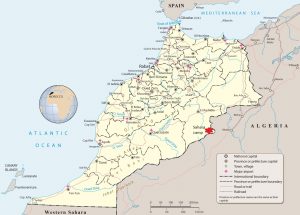Desert Experience
- Sahara camp
We headed towards our desert experience from Erfud but made several stops first. Our first stop was to fossils. Paleontological research shows that the area of Erfoud was a seabed where many types of marine animals existed – about 380 million yeas ago. There are many mines and quarries where the fossils are embedded in huge boulders. We stopped at a workshop where they were making various items from these fossils. We question the ethics of this but they were beautiful pieces.
- trilobite (?) fossil
- ammonite (?) fossil
- slicing a slab
- polishing
- forming a pedestal
- finished piece
We stopped at a ksar (fortified village) to visit a woman. A ksar is a village of attached houses and other structures, often with a wall. They are usually built of adobe. The woman is a widow and lives with her two school-age sons. She has a couple of children who are living in the city, have jobs, and help support her.
- street scene
- street scene
- enter ksar
- looking at structure of ksar
- thick adobe walls
- tea
- our host
We stopped at one more place to watch a camel being milked and to taste the camel milk.
- using the baby to start milk flowing
- milking
- calf gets to finish
- camel milk
Then off to our desert encampment in 4-wheel drive vehicles. We found the camp quite luxurious. (Especially when compared with our visit to a nomad.)
- across the sands
- desert
- sand dunes
- our encampment
- right is our tent
- our bed
We visited a nomad and his family. It was a bit depressing. The father of the family (76 yrs old) had been a truck driver but was away from his family too much. He returned to nomadic life and was very happy because he felt free. However, he admitted that his wife was very unhappy and only one son remained with him to help him. The rest of his children came to visit only a couple of times a year and only one day at a time. The father ruled the family!
- family tent
- father
- grandchild
- daughter-in-law and child
- mother praying
- daughter-in-law demonstrates spinning
- greeting the mother
- father
- at entrance to home
- stove
- dried chicken
- farewell
- surroundings
- surroundings
Our first evening we drove from our camp, climbed a sand dune to watch the sunset.
- moon rising
- sand dunes
- kami berdua
- watching the sunset
- sunset
The next morning we got up at 5:30 to watch the sun rise!
- it was cold
We then took a 45-minute camel ride. What fun!
- off to find the camels!
- found them
- early morning shadows
- preparing to get off
- Ron’s driver
- non-saddled camels!
After the ride, we saw a very old Berber cemetery. One the way home we stopped at a place where we had an introduction to gnaoua music (gnawa), an ancient African Islamic spiritual religious songs and rhythms. It is characterized by using castanets, a 3-stringed lute, and a drum. It is usually a few lines repeated over and over. We also participated in the dancing to the music.
- Berber Muslim cemetery
- drums and castanets
- Gnaouan music
- lute
- music
Our last visit while in the desert was to a very enterprising farmer. This farmer’s father started the farm in 1985 and he has now taken it over. He grows 5 species of dates plus a variety of vegetables. He needs to pollinate the dates by hand which means climbing the palm tree. He dug a well and built an irrigation system. He has one son helping him and the other sons are in town helping to support him. Date trees take about 5 years to produce. In a good year he can make a good income; but he may only have 3-4 good years in 10.
- farmer
- beehive
- explaining his dates
- climbing palm
- dates
- date palm trees
- irrigation system
- vegetables
- farm
- preparing for tea
- with grandchild
When we returned to the camp, we took a short walk around the camp, found some bleached camel bones and enjoyed another lovely sunset.
- bleached camel bones
- sunset
It was extremely windy our last night. Sand was everywhere–even on our bed! But the next morning–our last–was beautiful.
- sand on bed!
- our tent
- beautiful morning























































































